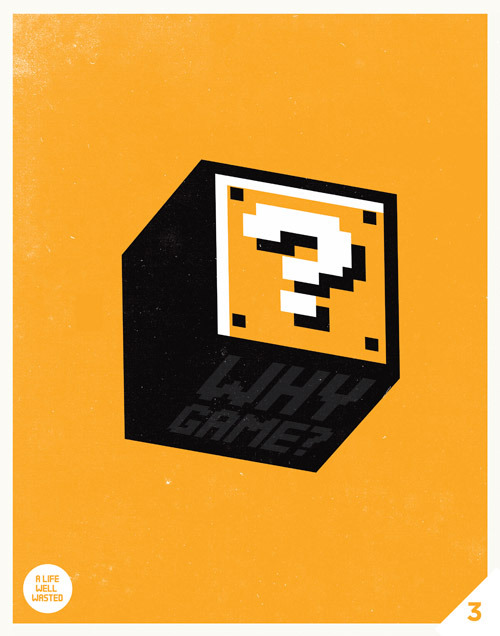On Using Games to Escape
By generic_username 22 Comments
[Content Warning: claustrophobia, severe injury, bullying, body image]
Sometimes I find myself wondering, “Why do I play games?” It’s maybe not the most important question, and it’s definitely a little self-indulgent, but it’s not exactly an easy question, either. There’s not any one answer that covers everything for me; there are a million completely different reasons I play games, and some of them even contradict each other. Depending on the day, I might be playing a game for totally different reasons. Maybe I want to challenge myself intellectually with a puzzle game, or maybe I’m seeking the fulfillment of completing something by finishing a game. Maybe I’m hoping to have an emotionally moving experience, or play through an interesting narrative. There are so many different experiences I might be looking for when I play games, though there’s probably one that I seek out more often than any other.

To be honest, I usually play games because they offer me an escape from reality. Lately, the escapism I seek is just an escape from the everyday mundanity of adult living, but… at certain times in my life, I’ve played games to escape from legitimately unbearable circumstances. I could always lose myself in the glow of a television set; the only light still shining in my darkest moments. And while escapism has often been a savior for me, I occasionally see people looking down on it. And I find it kind of frustrating. For example, there’s a podcast I used to listen to called A Life Well Wasted. It’s been dead for years, but I loved every drop of it while it was running. That includes the segment I’m about to discuss, but it happened to be the first thing that came to mind when I was thinking of examples I could use here. Anyways, one episode of the show features a segment where the host asks a bunch of strangers why they play games. There were a few different answers, but the answer he got more than any other was… “to escape.” And he seemed kinda bummed out about that. He wasn’t judging the people who gave that answer or anything, just expressing concern at the idea that escapism was really the best the medium had to offer. Wasn’t there something better, something valuable, that video games could aspire to do?
Back when that episode was released, the question of “are games art?” was still a source of debate… unlike today, where the answer is an eye roll and an annoyed “yes”. Modern games offer a wide variety of experiences, ranging from outlets for escaping from reality, to time killing mobile apps, and to deep, personal expressions found in certain independent games. I love the power games have to express ideas and create empathy through mechanics. The unselectable-but-still-visible choices throughout Depression Quest strongly mirror experiences I have all the time, so playing the game got me to finally seek treatment for my previously-undiagnosed depression. Undertale left me speechless when a character didn’t let me fight them a certain way by physically destroying the menu button for it. There was only one way to win that fight, and the scene’s merging of gameplay systems and narrative gave that encounter stakes that I don’t think anything but a game could recreate. My experiences with these games; games that to me never once acted as escapist outlets; I hold them very close to my heart. But the time I’ve spent escaping from reality with a game… it’s just as important, I think. The dark places I was escaping from were pretty fucking dark.
I first started playing games when I was very young; before I could even read, actually. The world I lived in, even at that young age, had already given me cause to distrust it. Before I started playing games, I was in accident that nearly killed me. My house caught fire with me still in it. I didn’t die, but I was severely burned; badly enough to scar my body for the rest of my life. I have vivid memories of the fire, but there’s one moment that I remember terrified me more than any other part of that experience. I remember trying to turn the doorknob, desperately trying to escape, but… I couldn’t turn it. I don’t remember why. It almost certainly wasn’t locked, but in my panic, I couldn’t get it open. I was trapped.

After the accident, I spent a while in the hospital. I remember bits and pieces of it. I remember a lot of time spent in a bed, and it being hard to walk. I remember getting my wounds cleaned, which was about as pleasant as it sounds. In general, a lot of confinement, though. When I was through with physical therapy and had finally mostly recovered, home wasn’t really much better. My mother, who back then was younger than I am now, was pretty shaken by the experience; she never really let me out of her sight after that. She got overprotective, though not without a really good reason (obviously.) Still, kids are inherently curious, and I was no longer able to explore. Reality was confinement back then, and that sense of wonder and discovery I craved could only be fulfilled in my imagination.
I obviously spent a lot of time playing pretend, like any young kid does, but when I played a video game for the first time, it was like… it was like a tangible, extant representation of my imagination. My first video game was The Legend of Zelda: A Link to the Past, and even though I couldn’t read yet and had no idea how to make progress, it made me feel like I was somewhere else. Playing Zelda back then was a lot like playing pretend, but with a world that actually reacted to the things I to did. I was able to escape from a painful world that held me prisoner into a colorful world that was specifically designed to stimulate my curiosity. Hyrule was hiding countless secrets from me, and I would uncover each and every one of them. In video games, I was finally free to see the world; it didn’t matter to me that it wasn’t the real world.
A Link to the Past gave me a feeling of freedom that I could not find in reality after the fire. Weeks and weeks spent in the hospital, barely able to walk, made me feel completely suffocated. After almost losing her kid, my mother always kept me within arms reach; the breath I was hoping to take when I got home never really came. My constant search for secrets in Hyrule breathed for me, though, and it satisfied a craving for adventure that I couldn’t address in reality. It saved me, in a way. It let me experience childhood wonder when the real world wouldn’t provide it for me anymore. That escape was incredibly precious to me, and it wouldn’t be the last one I’d use to overcome the difficulties caused by the accident.
A number of years after the fire, when I was in second grade or so, I moved to another school. I had actually moved three or four times before then, but this school ended up being the first one I would attend for longer than a year. I did eventually make a few friends at my new school, but I also started getting bullied, pretty much constantly. It wasn’t exactly new to me; I was a dorky, kinda lanky kid who had creepy scars all over his legs. I was pretty sheltered at home, so I didn’t understand a lot of kid-type social stuff. I didn’t understand what behaviors other kids thought were “weird” or why some cartoons were “for babies” or why sports were fun at all. And at home, my scars were totally normal, so I didn’t even think I was supposed to cover them. I would wear shorts to school and not realize it was, well… a problem. It was hard to look at if you weren’t used to it. On top of that, I excelled academically without any real effort, which was probably miserable for the kids who were struggling in school. I don’t really know if anyone actually cared about that, but I can see how that might stir up some feelings of resentment in a kid.
Kids kinda didn’t want to hang out with me, so they’d play this fun game where any time I approached them during recess, they’d take their group and go play somewhere else. But that was as far as it went before this most recent transfer. At this new school, the bullying was a bit more of an active process. I don’t even know if the scars had anything to do with why they picked on me; they might have just been a bonus flaw on someone they were gonna torment anyway. They never hit me or anything — maybe the scars helped there; maybe beating up the burned kid was crossing a line or something. They did mock me relentlessly, spread rumors about me, call me gross, tattle to teachers on me about things I didn’t do, laughed at me whenever I got hurt, and invited me to play sports with them just so they could take it back when I got to the field. It was nonstop, but it wasn’t the worst bullying in the world by any stretch of the imagination. I didn’t let it bother me. Most of the time.
I was able to shrug it off because of a video game. Once again, I found myself retreating into the vast world of Hyrule, but it was different this time. It was in an all-new dimension; it was totally in 3D… I was playing Ocarina of Time. But I was playing it for different reasons, now. Sure, Ocarina gave me that same sense of wonder that its predecessor did, but it had something else in it that I needed far more in that moment. It had Link. It had that specific Link. In Ocarina, Link begins his adventure as an outcast, ostracized by his peers for being different. He was different through no fault of his own, but it didn’t matter. He was different, and that was enough. But… you eventually find out that Link was different because he was important. He wasn’t supposed to stay in the forest his whole life like they were. Link was destined for greater things.
Link’s backstory in Ocarina isn’t unique by any measurement. It’s a classic and totally cliched setup for the same bog-standard hero’s journey story we’ve been told a million times. There were countless stories like it written before it was made, and countless more have been written since. The “chosen one” aspect of the story is actually seen as kind of a harmful trope these days, and with good reason: if kids are convinced they were born destined for greatness, then they have little incentive to try to achieve greatness through hard work or kindness to others. But that “chosen one” story saved me back then.
Coping with bullying by clinging to stories like that is probably not unique to me, but… it helped me accept my scars as a part of me when everything around me was rejecting them. With all the teasing, I eventually started covering them up, but it was already too late. The other kids knew they were there. They weren’t gonna stop saying I was gross just because I was pretending I wasn’t gross anymore, were they? If the way I phrased that sentence is any indication, that kind of thing can really fuck you up. I have moments where I feel like I’m less human than everyone else because I know no one else looks like me. Those fears are actually only five or six years old, though; when I was younger, I didn’t think that way at all. And it’s because I would escape into Ocarina when I got home. I could slip away into this world where I was a hero. I was a hero even though I was different. No… I was a hero because I was different. In the real world, my scars were a burden, but in Ocarina, my scars were a sign that I was fated for better things.
Eventually I started to think that was true for the real world, too. Years later, I would realize that life wasn’t that convenient, but at least that earlier belief kept my childhood and early adolescence free of the crippling self-image issues that would have otherwise plagued it. And yeah, I’m dealing with a lot of those issues now, in my adulthood, but I’m pretty sure that spending my formative years with them would have only made things worse, not better.
Escapism may not be a very well-respected behavior, but I don’t think it’s an inherently bad one. I think it gets a bad rap. I mean, obviously you can take it too far — if you start neglecting people who count on you, or start neglecting yourself, that’s a problem. But I don't think there’s anything wrong with you if you like to spend your free time absorbed in some other world. It's normal to feel like reality is unable to fill some emotional void inside of you. If slipping away to another world is the only thing keeping you from giving up on this one, then I think you should stay there as long as you need to. And I don’t think any of your experiences there are invalid, or unimportant, or meaningless. I don’t even think they’re any less valuable than the responses other types of games elicit. I love games that work to expose you to reality rather than shield you from it, but I still value all the time I “wasted” trying to escape. I appreciate those hours where The Legend of Zelda whisked me away; I am grateful for the time I spent collecting gym badges in Pokemon Yellow… to me, those experiences were flashes of light in an endless expanse of dark. When the real world seems hopeless, it’s okay to find hope in another one. Just try and bring a little with you when you come back.
